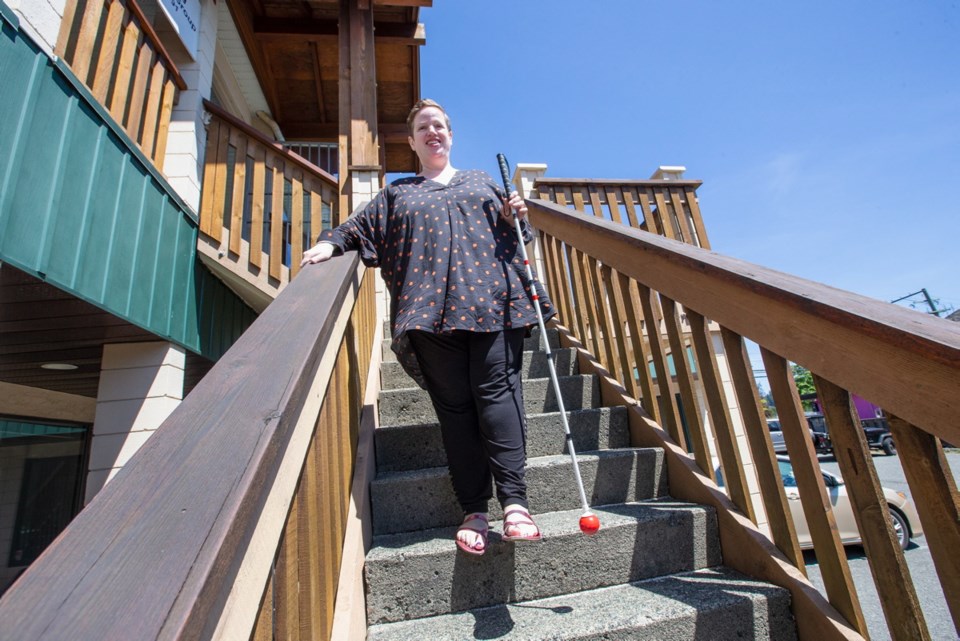Shannon Underdown-Ngongo would like to apologize. She would like to say sorry for not appearing to be legally blind, which she is.
She would also like to say “my bad” for her lack of depth perception, which adds a — shall we say — elastic quality to her ability to socially distance while shopping.
She would also like to ask forgiveness for her service dog’s inability to read the directional arrows on the floors of store aisles. Hers is a pre-COVID canine.
In addition, she wishes to beg pardon for her hearing loss. Ditto for her inability to read cashiers’ lips when they’re wearing masks and she’s trying to figure out what they’re saying.
Also, she expresses regret to those who glare at her when she doesn’t wear her own mask, the one that gets tangled in her hearing aids.
And, while she’s at it, she might as well show unmitigated remorse for all the other actions that cause the self-appointed Pandemic Police to huff and puff and work themselves into a self-righteous lather as she struggles to navigate this strange new world.
Underdown-Ngongo conveys all these apologies with tongue firmly in cheek and funny bone intact. She sees humour in her predicament, which is more than can be said for the pinch-mouthed shoppers who look ready to call 911 every time she unwittingly brushes too close or inadvertently walks into a Plexiglas barrier at the sales counter.
The Saanich woman has Ushers 2, a condition that causes hearing loss from birth and vision loss that begins in adolescence or adulthood and gets progressively worse.
In her case, the second half of the equation didn’t show itself until the youngest of her three children was a newborn. “I got up one night to get her a bottle and said: ‘I can’t see.’ ” That’s when doctors diagnosed her syndrome. Two weeks later, the authorities yanked her driver’s licence. That was 16 years ago.
The condition has taken away her peripheral vision and left her with only limited central vision. “If I’m looking right at you I can see your nose and your eyes, but I can’t see anything else.” It’s hard to focus on things that move, too, and hard to tell how far away things are.
So, sometimes she trips over piles of boxes. Sometimes she misses the hand sanitizer at the entrance to the store (“My kids say: ‘Hey Mom, back up’ ”). She has to pick items off the shelves and peer at them closely to ensure that she’s buying the right thing. (“Tell me what you think you bought,” her children will gleefully say when she empties the grocery bags at home. Chipotle-flavoured ketchup? Blehh!) And yes, she and her directionally challenged dog, Neva, occasionally miss those aisle arrows, causing people to bark at her (isn’t that Neva’s job?). Some of the barkers insist that her eyesight is just fine, which is news to her.
In their defence, her inability to see clearly isn’t immediately obvious, particularly if she isn’t wielding her white cane. “People say I don’t look blind until I walk into something,” she says.
And that brings us to the point she really wants to make: “Don’t be so quick to judge. You can’t tell where a person is at from looking at them.”
In these days of instant, sanctimonious outrage — the toxic scourge of our social media-fuelled time — we could all use that advice, and not just in relation to Underdown-Ngongo’s situation.
Take, for example, what has happened to her brother and his wife, who recently returned home to Victoria after working in Alberta. Before they had a chance to change their licence plates, the vigilantes struck, leaving nasty notes on their cars without having a clue who they were.
We shouldn’t be surprised by that, not in an age in which instant indignation and the condemnation of others have been elevated to virtues, and in a city with more judges than America’s Got Talent. This summer’s assumption that any car bearing out-of-province plates was packed with COVID-ridden rule-breakers followed this spring’s vilification of anyone pulling up to the ferry terminal for what appeared to be non-essential travel. (After writing about the latter kerfuffle in April, I heard from a couple who suffered disparaging glares from their fellow passengers every time they travelled to Victoria for cancer treatment. Another ferry user said she was assailed by people who, seeing the bikes on the back of her car, assumed she was going on vacation; in reality, she was going to the Okanagan to care for her gravely ill mother.)
Somehow we have made the leap from “Be kind, be calm, be safe” to “Those who appear to be heretics should be burned at the stake.”
Sorry, says Underdown-Ngongo, but appearances can be deceiving. She’s really doing her best. “I’m trying.”
The rest of us could try harder, too.



